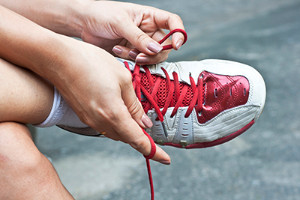
Running shoes are worn for various reasons that can range from training for a marathon to getting in shape. The right shoes will fit correctly from the beginning and will not need a break-in period. It helps to wear shoes that have approximately a half inch of space between the top of the shoe and the top of the toe. This can help to improve comfort as running can negatively impact the feet. A shoe that fits slightly tighter is the running preference for speed. This type of shoe may provide a heel that is form-fitting and can hold the foot in place easily. It is important to be aware of the kind of arch the foot has and there are different types of running shoes that can be accommodating. Neutral running shoes will benefit those people who have medium arches and offer added shock absorption. People who have low or flat arches may want to choose stability running shoes as they may be helpful in minimizing overpronation. Motion control shoes can help runners who have excessive pronation since these shoes can help to stabilize the foot. A podiatrist is qualified in determining what type of running shoes are best for you, and it is suggested that you speak with this type of doctor who can provide you with correct information.
If you are a runner, wearing the right running shoe is essential. For more information, contact one of our podiatrists from Pennsylvania. Our doctors can provide the care you need to keep you pain-free and on your feet.
Choosing the Right Running Shoe for Your Foot Type
To increase performance and avoid the risk of injury, it is important to choose the right running shoe based on your foot type. The general design of running shoes revolves around pronation, which is how the ankle rolls from outside to inside when the foot strikes the ground.
- Neutral runners are able to choose from a wide variety of shoes, including minimalist shoes or even going barefoot.
- Runners who overpronate, or experience an over-abundance of ankle rolling, should choose shoes that provide extra motion control and stability.
- Runners who underpronate, or supinate, have feet that have high arches and lack flexibility, preventing shock absorption. They require shoes with more flexibility and cushion.
If you have any questions please feel free to contact one of our offices located in Plymouth Meeting and Ambler, PA . We offer the newest diagnostic and treatment technologies for all your foot and ankle needs.
